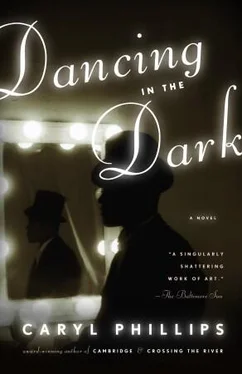Sitting by himself beneath the overhanging branches of a tree in a moonlit Central Park, he weeps silently. It is true, journeys don’t always leave footprints. His poor father understood this. Tomorrow he will write Mr. Ziegfeld a letter and make everything all right. Surely, Mr. Ziegfeld will understand his sudden departure was not meant to suggest any unhappiness or discomfort, and the letter will, of course, contain no mention of anything beyond gratitude.
Her father-in-law’s eyes are open and he stares quizzically, as though struggling hard to see something behind her, but Lottie ignores the anxiety in his gaze and reaches down her hand and quietly closes both of his lids. Her mother-in-law sits by the side of the bed, still in her nightdress, clearly shaken with grief and incapable of either speech or action. Lottie touches the older woman’s shoulder and tells her that her husband most likely suffered a heart attack in the dead of night, but the older woman says nothing, her mouth simply drooping ajar. Lottie looks again at her father-in-law, and senses that with the arrival of the final blow, relief must have flooded the poor man’s body, for he appears to be strangely serene. After the morning in which he cut both Billy “Too Fine” Thomas and the innocent customer, a deeply disturbed Fred Williams never again set foot inside his barbershop, and he and his wife chose instead to move somewhat unpredictably between their son’s house, the Harlem residence that Bert had acquired for them, and Riverside, California, as they made laborious preparations for a return to the Bahamas, but neither of them could decide when this migration might occur. Eventually a depressed Fred began to withdraw even further into himself, and the more he did so, the deeper became the melancholy that consumed his desolate wife. But now, as Lottie looks down at this peaceful man, she is overwhelmed with a sense of relief for she is sure that the demons that had begun to haunt his soul have now almost certainly abandoned him. His son is touring somewhere in the midwest with the Follies of 1912 and later this same day, after she has made all the funeral arrangements, she will wire him the news of his father’s sudden departure and she will choose her words carefully for she wishes to spare her husband any feelings of guilt or responsibility. Casting a final, baleful glance at the still-warm body, she decides to leave her grieving mother-in-law alone with her late husband, and begin to assiduously apply herself to the tasks at hand. By doing so she is hopeful that she might ensure that her father-in-law is treated expeditiously and that her husband’s already troubled spirit is spared the worst of this shock.
He stares at the instrument that scrutinizes him. Only the clicking heartbeat of the machinery lets him know that it is alive and well, but whatever magic occurs inside the black box is beyond his knowledge. Despite his misgivings, he has little choice but to trust that the device will accurately record his offering and not impose its own authority upon him. He already understands that this may be the new art of the twentieth century, a means of transporting one individual performance to all corners of the country, and he wishes to be a part of it. So, when Mr. Tarkington Baker asked him if he might be persuaded to participate in a moving picture he cautiously agreed, and he now finds himself peering at the camera in the hope that this transaction might produce a fair and faithful record. However, the black box promises him nothing and it stares back as though daring him to perform. And so this is now his audience? The instrument gives him no clue as to what is expected and it has occurred to him that he is therefore free to do whatever he pleases. We’re ready now, Bert. Mr. Baker has set up the scene, and put the players in position, and all eyes are on Bert. He stares at the black box and a sharp surge of excitement rushes through his body. The box cannot howl in protest. It cannot leave its tripod and walk out in disgust. The box cannot disapprove of him. Everybody ready? Bert? He moves into place in front of the camera and looks from astonished face to astonished face, but nobody says a word. And then he gazes at his audience, who are hidden away somewhere at the back of the black box.
One week later the film is edited and he squats awkwardly in a room that is crowded with people and equipment, so much so that he finds it difficult to secure a space into which he might bend his tall frame into a sitting position. Although it seems unlikely, there are four men in this tiny dark place, and then somebody’s hand reaches up and switches off the light and the images begin to flicker against the wall. For eleven minutes he sees himself performing an act that he has never before witnessed, moving easily, the hand gestures perfect, the timing flawless. He watches himself and in the darkness he is quietly moved. And then it is over and the anonymous hand snakes up the wall and snaps the light back on and Bert continues to sit and say nothing even though all eyes are upon him. He pauses for a moment, and then he speaks: Again . For a brief moment Mr. Baker looks quizzically at him, and then he simply waves to the man behind the projector and again the room is plunged into darkness and the images begin to flicker against the wall. As the film thunders through the projector for a second time, Bert looks at the moving picture and he feels proud of it, although he already understands that not everybody will share his feelings. When the projection is completed, and the lights are turned back on, he scans the room with a smile upon his face, but it soon becomes apparent that he is the only one who is smiling. Five weeks later they premiere the motion picture at a location in Brooklyn, but he is advised that it might be better for all concerned if he does not attend. And so he waits to hear the news of how his audience have responded to the film, and the single word “riot” floats back to him. They are angry because he has chosen not to cork his face. Why else would they respond like this? Between his needs and his audience’s expectations he walks a tightrope, but with only a black box for guidance he now knows that he is always liable to miscalculate. He understands the nature of the problem — he needs to see, hear, feel his audience — but they too must understand that there is, on his part, no desire to cause offense.
DARKTOWN JUBILEE (1914)
The appearance last night of the celebrated Negro comedian Bert Williams in top hat and zoot suit in the motion picture Darktown Jubilee caused a powerful outburst of resentment among the audience, which could not be contained without violence breaking out. Although long used to the vaudeville headliners reaching out to embrace this new world, audiences have every right to expect them to remain loyal to the mode of entertainment that brought them their celebrity on the planks. But not so with our Mr. Williams. Gone was the familiar “darky humor” heavily laden with pathos, and in its place he gave to us an uncorked colored person of cunning and resourcefulness that left a sour taste in the mouth of all who had paid money to attend this presentation.
After the third motion picture Bert decides no more and he quietly turns his back on the black box. His final two films (in familiar blackface and gloves) have not been a happy experience, and he sees little point in persevering with an art form that, entombed as it is in silence, cannot even offer him the relief of dialectdrawling humor, or the possibility of conquering the audience with a plaintive tune. Bert instructs his wife that they no longer take calls from Mr. Tarkington Baker.
A NATURAL BORN GAMBLER (1916)
Williams gives his watermelon grin most satisfyingly.
FISH (1916)
The colored character is a charming big child of arrested development.
Читать дальше












